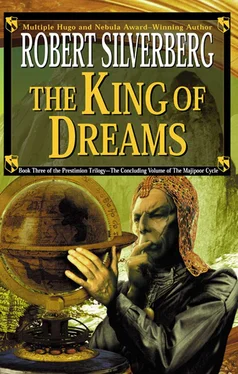Dekkeret said, “These rooms beyond here—I’m going to clear them away, and build a chapel for the Coronal, I think. I feel it’s needed here.”
“A good idea.”
“A chapel right here, you mean?”
“The general idea of building things. I like it that you already have that in mind. If you want a chapel here, build one. Put your mark on the Castle, Dekkeret. Take it in your hands. Shape it as you will. This place is the sum of all the kings who have lived in it. We’ll never be finished building it. So long as the world lasts, there’ll be new construction up here.”
“Yes. Majipoor expects it of us.”
It pleased Prestimion to be making this last tour of these sacred rooms with the sturdy, strong-willed man whom he had picked to succeed him. Dekkeret would be a splendid Coronal, of that he was sure. It was a necessary thing for him to know that he had bestowed such a successor upon the world. However great his own accomplishments had been, history would not forgive him if he provided Majipoor with a weakling or a fool as the next king.
Great Coronals had made such mistakes in the past. But Prestimion was confident that no one would ever lay that charge against him.
Dekkeret would live up to all expectations. He would be a different sort of king from his predecessor, yes, earnest and straightforward where Prestimion had often relied on craftiness and manipulation. And Dekkeret cut a grand and heroic figure, who commanded respect merely by walking into a room, whereas Prestimion, built by the Divine on a much smaller scale, felt that he had had to achieve kingliness by sheer force of personality.
Well, these differences would make it easier for the people of future years to tell one of them from the other, anyway. “In the time of Prestimion and Dekkeret,” they would say, hearkening back as if to a golden age, the way sometimes people spoke of the times of Thraym and Vildivar, or Signor and Melikand, or Agis and Klain. But those kings existed only as interchangeable paired names, not as individuals in their own right. Prestimion hoped for a kinder fate. So different was he from Dekkeret that those who lived in time to come would of necessity always see in the eyes of their minds the image of the quick, supple little Prestimion, the master archer, the great planner, and the broad-shouldered big-bodied form of Dekkeret beside him, and they would know, forever, which one was which. Or so Prestimion hoped.
“Shall we stroll out to the Morvendil Parapet?” he asked, gesturing toward the northwestern gate. “The view from there by night is one I’ve often enjoyed.”
“And will again, many times,” said Dekkeret. “You will come visiting often?”
“As often as is appropriate for a Pontifex to show his nose at the Castle, I suppose. But that’s not often at all, is it? And you won’t want me here, anyway. However you may feel right now, you’ll not want me snooping around the premises once you start believing that the place is really yours.”
Dekkeret chuckled, but made no other response.
They went quickly through the halls, out into the dusk. Distant guards saluted them. Others, shadowy figures who might have been princes of the realm, peered at them from afar also, but no one dared approach: who would interrupt the private conference of the Pontifex and the Coronal? A covered walkway that carried an inscription from Lord Dulcinon’s time took them into the Gaznivin Court, which had a balcony at its lower end that gave access to Lord Morvendil’s Parapet.
What sort of ruler Lord Morvendil had been, or even when he had lived, were matters of which Prestimion had no knowledge, but the parapet itself, a long and narrow breastwork of black Velathyntu stone, had long been one of Prestimion’s private places of refuge from the cares of the crown. Here the Mount tapered to a narrow point, falling away below the Castle wall in a steep declivity that gave a spectacular view of several of the High Cities and part of the band of Inner Cities just below. Darkness was coming on quickly down there, and islands of light were springing up against the giant mountain’s flank. It was always instructive to consider that this small spot of light off to the left was actually a city of six million people, and that dot there the home of seven million more. And that one down there, pressed up snugly against the side of the mountain and surrounded by a semicircle of inky blackness, was Prestimion’s own lovely Muldemar.
Memories stirred in him of his youth in that beautiful city, his happy family life, the warm and loving mother and the strong noble father, taken so early by death, who had seemed as kingly as any Coronal. What a warm community, what a satisfying existence! He had never known a moment of sadness or despair. If the Castle had not called to him, he would be Prince of Muldemar now, busy and content among the grapes and wine-cellars.
But it had seemed a natural and normal thing for him to move outward from the bosom of his family and the princely responsibilities of the city of his birth to the service of mankind. So the yearning had come over him to be Coronal, and thus to hold all of Majipoor in warm familial embrace, he the focus of everyone’s dreams, he the benign leader, he the father of the world.
Was that how he had seen it then, or was it simple power-hunger that had impelled him to the throne? He could not say. There had, of course, been some component of the desire for mastery in his rise through the Castle hierarchy. But that had been far from his dominant motive, he was certain—very far. Prestimion had learned that in the Kor-sibar war.
He had fought then for the throne, yes, fought desperately, but not so much because he simply wanted it, as Korsibar had, but because he was sure he deserved it, that he was needed for it, that he was the necessary and unique man of his era. No doubt many a dread tyrant and monstrous villain had felt the same way precisely about himself, in the long course of human history going back to the all but forgotten times of Old Earth. Well, so be it; Prestimion had faith in his own understanding of his own motives. And so, he knew, did all of Majipoor. He was beloved by all, and that was the confirmation of everything. He had served ably as Coronal; so would he serve now, now that he was Pontifex.
He looked toward Dekkeret, who was standing a little apart, plainly unwilling to intrude on his reflections. “Have you given thought yet to how you will begin?”
“New decrees and laws, you mean? Overturning ancient precedents, repealing existing protocols, standing the world on its head? I thought I might wait some little while before setting out on that course.”
Prestimion laughed. “A wise position, I think. The Coronal who governs wisest is the one who governs least. Lord Prankipin put the world back on its course by lessening the grip of government; Confalume followed that course, and so have I. The benefits can be seen on every side.—But no, no, I wasn’t speaking of legislative matters, only symbolic ones. Is it your intention to sequester yourself here at the Castle until you’ve fully settled into your tasks, or will you show yourself to the people?”
“If I hide here until I feel I’ve fully settled into my tasks, I may grow old and die before the world sees my face. But surely it’s too soon for a grand processional, Prestimion!”
“I would say that it is. Save the processional for the traditional fifth year, unless circumstances force it sooner. But once I became Coronal I lost little time in visiting the nearby cities, if nothing farther. Of course, I was ever a restless man: you are more content to see the same set of doors and windows several weeks running, I think. Still, there’s something to be said for a Coronal’s getting himself away from the Castle as often as is seemly. One gets a damned narrow view of the world from thirty miles up.”
Читать дальше












